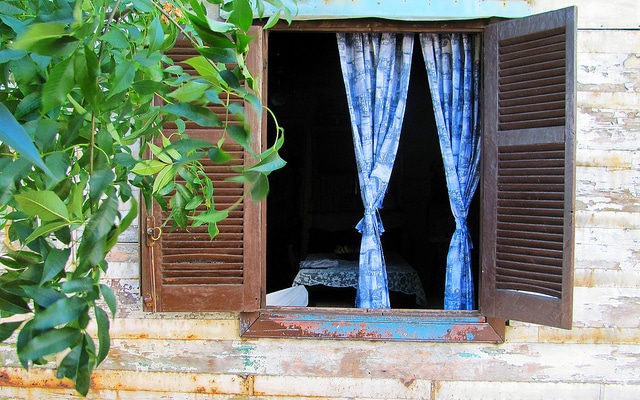
15 Simple Ways to Live Green on a Budget
 Some people are under the misconception that the only way to live an entirely green life is to live in a rural area (or at least live on the outskirts of the big city), drive a hybrid, buy only organic foods, install solar panels or a wind turbine, set up a large compost in your yard, harvest rain water, spend lots of money to get only environmentally-friendly products, spend time remodeling your home in order to make it more energy-efficient, and make major changes in how you live so that all your actions focus on sustainability.
Some people are under the misconception that the only way to live an entirely green life is to live in a rural area (or at least live on the outskirts of the big city), drive a hybrid, buy only organic foods, install solar panels or a wind turbine, set up a large compost in your yard, harvest rain water, spend lots of money to get only environmentally-friendly products, spend time remodeling your home in order to make it more energy-efficient, and make major changes in how you live so that all your actions focus on sustainability.
While that would be wonderful if we could all live that way, there are ways we can live green right here and now. In fact, here are 15 simple tips to help you live green on a budget.
- Green is all about your frame of mind. The first step is to recognize whether your actions are harmful to yourself, your pets, and the environment around you. Once you have done that, it is all smooth sailing from there, so to speak.
- Open the blinds and pull back the shades. When the sun is out, it is a great source of light and heat for your home. Why use artificial light when the real stuff (with no cost to you) is directly outside your window?
- While you are at it, open your windows. Air out your home. By doing this, you are getting rid of the some of the harmful toxins polluting your home and making it cleaner, greener and safer for you and your family. (Getting outside more will also help limit your exposure to indoor air pollution.)
- Eat at home more and plan your meals out ahead of time. This will help you save money at the grocery store and waste less food.
- If you do have leftovers, then plan on reusing them for another meal later. Food waste can and should be put into a compost bin. No reason to waste it or add to the already overflowing landfills, when you can do a little indoor composting.
- Now that you are planning your meals, you should work to have more home-made or at least non-prepackaged meals as possible. Organic fruits and vegetables, meats without added hormones and fresh herbs/spices taste great. They are also much healthier than eating food filled with harmful additives and preservatives. In all honesty, they don’t cost that much more either (especially when you buy generic brands versus name brand).
 Grow as many of your own fruits, vegetables and herbs as you can at home. It doesn’t matter whether you live in an apartment or a house, you can grow some of your own food. This will help you cut down on costs, give you a source of organic food and aid in your long-term health.
Grow as many of your own fruits, vegetables and herbs as you can at home. It doesn’t matter whether you live in an apartment or a house, you can grow some of your own food. This will help you cut down on costs, give you a source of organic food and aid in your long-term health.- Turn off the lights when you leave a room. The more you do this, the more it becomes second nature.
- Practice water conservation. Pay attention when brushing your teeth, washing dishes, taking a shower, etc. and turn off the water when you don’t actually need it running. Look at how much water you can save when you turn off the tap.
- Set your thermostat by the season and either add, or remove, layers accordingly.
- Plug your electronic equipment, television, stereo, computer and other key components in to a power strip that you can turn off when you go to bed or when you do not plan on using them for a specific period of time. When you have something plugged in it is using energy, whether it is off or not. Vampire power can make up to 10% of your energy bill.
 Cut down on your own vehicle costs by driving less and carpooling, walking, riding, biking, skating, jogging more. Even using public transportation will help lower your vehicle’s harmful emissions. If you have to drive often, you know where you can find a good combustion catalyst to help improve your fuel economy and lower emissions (hint: it’s Biofriendly).
Cut down on your own vehicle costs by driving less and carpooling, walking, riding, biking, skating, jogging more. Even using public transportation will help lower your vehicle’s harmful emissions. If you have to drive often, you know where you can find a good combustion catalyst to help improve your fuel economy and lower emissions (hint: it’s Biofriendly).- Go through your home and swap out your old light bulbs for more energy-efficient ones.
- Only use your washing machine and dishwasher when you have filled them up. If you can’t opt for cold water, then do so.
- Instead of buying “one-use” or disposable items, buy those you can use more than once. Better yet, buy recyclable.
These 15 simple actions cost very little and in most cases, will actually save you money rather than costing you money. It’s a great way to start off the year right and it’s a smart way to keep a lid on your monthly budget. If you have any other favorite ways to live green on a budget, I’d love to hear them!
Open window image by Diego Torres Silvestre, coin jar image by Andrea Travillian, fresh herb image by Shawn Allen, and walk in park image by Lara Mercer via Flickr Creative Commons



Post a comment